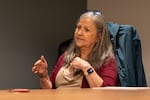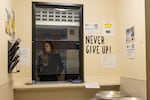This story originally appeared on Underscore.news.
Across the Pacific Northwest, Native nations and Native-led organizations are working to combat the opioid crisis, offering substance use disorder treatment programs to support their citizens, other Indigenous people and the broader community. Services span from the Native American Rehabilitation Association and Painted Horse Recovery in Portland to clinics across Oregon and Washington.
A new model of care is also popping up to address the opioid crisis: treatment vans. The vans administer medication and provide services for those struggling with substance use disorders. A recent study found that these vans expand access to treatment options, specifically medication for those in recovery, for both Native and non-Native people.
The Confederated Tribes of Grand Ronde opened the first opioid treatment facility run by a Native nation in Oregon in April 2021. In Washington, the Cowlitz Indian Tribe, the Confederated Tribes of the Chehalis Reservation and the Jamestown S’Klallam Tribe have all recently launched similar services.
“We know anecdotally that culture is prevention, that culture is medicine. But we are starting to understand now what that really means,” Danica Brown, citizen of the Choctaw Nation of Oklahoma and behavioral health program director at the Northwest Portland Area Indian Health Board told Underscore/ICT in an interview in February. “It’s your connection to culture that can mitigate those impacts of substance misuse.”
Related: Washington state lawmakers advance a bill to provide relief as opioids scourge devastates tribes
'A place where Indian people can feel proud to go’
The Cowlitz Indian Tribe provides services up and down the I-5 corridor for Native and non-Native community members struggling with mental health issues and substance use disorder. From Vancouver, near Washington’s border with Oregon to a city outside Seattle, the tribe operates four medical clinics and a treatment van.
When patients first walk through the doors at the tribe’s clinic in Longview, Washington, they are greeted with a scene far from most medical facilities — dreamcatchers hang from the ceilings, Native-made art adorns the walls and Eighth Generation wool blankets hang in many provider offices.
“It was very intentional that none of our facilities look like medical facilities,” said Kay Culbertson, citizen of the Fort Peck Assiniboine and Sioux Tribes, health and human services executive director for the Cowlitz Indian Tribe. “We wanted it to be a place where Indian people can feel proud to go. This is your facility, this is made for you.”
With health clinics in Vancouver, Longview, DuPont and Tukwila, the Cowlitz Indian Tribe gets around four thousands visits per year, according to Culbertson. They provide services to individuals from over 210 federally recognized tribes, said Emily Gardner, director of behavioral health for the tribe for over 12 years.

Kay Culbertson, citizen of the Fort Peck Assiniboine and Sioux Tribes, has served as the health and human services executive director for the Cowlitz Indian Tribe for seven months.
Jarrette Werk / Underscore News / Report for America
Both the brick-and-mortar clinics and the treatment van provide free services to anyone enrolled in a federally recognized tribe. They also service the broader community.
In August 2023, citizens of the Cowlitz Indian Tribe gathered with community members outside the Ilani Casino Resort. Cowlitz General Council Chairwoman Patty Kinswa-Gaiser offered a blessing before introducing the tribe’s first medication-assisted treatment van.
The white van is adorned with the Cowlitz Indian Tribe logo: a Chinook salmon cresting over Mount St. Helens. Inside, it looks like a medical office on wheels.
The wheelchair-accessible van is equipped with providers who can dispense medication and treat patients struggling with substance use disorder.
The goal is to eventually integrate primary care, behavioral health, substance use disorder treatment and pharmacy services.
“I think we will have the potential to see people who would not come to a clinic,” Gardner said.

In August 2023, the Cowlitz Indian Tribe hosted a traditional blessing ceremony at the Ilani Casino Resort for the tribe’s new mobile medication-assisted treatment van. The van will expand access to substance abuse treatment and services to both Native and non-native community members.
Jarrette Werk / Underscore News / Report for America
The tribe launched the van in August, purchased through funding from Healthier Here. It has been stationed at the clinic in Dupont, running part time, ever since. Funding announced last month will help get the van up and running and money for full staffing. The tribe is currently working to identify the best service route, though it is already providing services throughout King and Pierce counties, according to Madison Hitchcock, Cowlitz, communication coordinator for the Cowlitz Indian Tribe.
In March 2024, U.S. Senator Patty Murray announced $242 million in earmarked federal funds for projects across Washington state. From that package, $700,000 will go toward the Cowlitz Indian Tribe for the mobile medication-assisted treatment van, according to a press release. It will provide funding for three full-time staff positions: a nurse practitioner, a registered nurse or medical assistant and a client support specialist, Hitchcock said.
“The word ‘Cowlitz’ means seeker of the Medicine Spirit,” said Chairwoman Kinswa-Gaiser. “As we work to serve, heal and uplift our tribal members and surrounding communities, we are grateful to have the tools to deliver the help people need.”
Related: Washington Gov. Inslee signs fentanyl bill sending money to disproportionately affected tribes
'Methadone is medicine’
Inside a nondescript building in the heart of Salem, Oregon, painted purple camas flowers adorn the floors and art by Grand Ronde tribal members lines the walls. Welcome to Great Circle Recovery, Oregon’s first opioid treatment clinic operated by a Native nation.
It’s open to all.
“We are part of Confederated Tribes of Grand Ronde, but we see anybody with opioid use disorder,” said Jennifer Worth, medication-assisted treatment operations director at Great Circle. “Our primary focus is really making sure that we can meet people where they’re at and do everything we can to help curb the overdose rates that are happening across Oregon.”

Jennifer Worth, director of medication-assisted treatment operations at Great Circle Recovery, on the other side of the glass, explains how patients have the opportunity to enter small private rooms for face-to-face conversations with medical staff, as well as to retrieve their medications.
Jarrette Werk / Underscore News / Report for America
In April 2020, the Confederated Tribes of Grand Ronde opened Great Circle Recovery in Salem. One year later, in the summer of 2022, Grand Ronde started its mobile medication unit and in February 2023 it opened a second brick-and-mortar clinic in Portland.
“Grand Ronde means Great Circle, so the name is another version of Grand Ronde,” said Kelly Rowe, citizen of Grand Ronde and executive director of health services at the Confederated Tribes of Grand Ronde. “The name is also meant to convey our approach with our clients at Great Circle. Our concentration is on healing of the four themes of the medicine wheel: emotional, spiritual, physical and mental.”
Between the two sites and the mobile unit, Great Circle Recovery currently sees around 470 patients, approximately one-third who identify as Native American, according to James Laidler, medical director at Great Circle Recovery.
“Methadone is medicine,” Worth said. “Opioid use disorder is a chronic health condition. People need access to treatment, and we need to lower the barriers and increase the compassion.”

This retrofitted 2006 Winnebago Sightseer has had many lives. It was used by the behavioral health clinic to provide both diabetes prevention and breast cancer screening before Grand Ronde turned it into the Great Circle Recovery’s mobile medication unit.
Jarrette Werk / Underscore News / Report for America
Both the brick-and-mortar sites and the mobile unit offer a variety of wraparound services, seeking to break down barriers to care. Beyond dispensing medication such as methadone and buprenorphine, patients at Great Circle also have access to services like therapy, laundry, childcare and job search support.
“In general, most addiction treatment in the U.S. and in Indian Country is hard to come by and high-barrier,” said Todd Korthuis, addiction medicine specialist and professor of medicine and head of addiction medicine at Oregon Health & Science University. “What an innovative and exciting model [Great Circle Recovery] is that is reaching people who would otherwise not be served. Both tribal members and others in the community.”
In January, Korthuis, Laidler and Worth, among others, co-authored a qualitative study about Grand Ronde’s mobile medication unit. The study found that the mobile unit has helped expand access to opioid treatment for both Indigenous and non-Indigenous people living in rural communities.
“The opioid crisis needed another solution,” Worth said.
Related: Washington state lawmakers advance a bill to provide relief as opioids scourge devastates tribes
From Monday to Friday each week, the unit departs on the same route. From the Grand Ronde Health & Wellness Center, to the First Baptist Church in McMinnville and then back to the Salem clinic, where it resides overnight.
Great Circle’s mobile medication unit is staffed by a nurse, a counselor and a safety technician, dispensing methadone or buprenorphine to about 45 to 50 patients each day, according to Worth. Great Circle Recovery is currently working to launch a second mobile medication unit, this one out of the Portland location. The goal is to expand access to care even further.
“That one person matters and they need to know they matter,” Worth said. “Wrapping your arms around people, that’s really what Great Circle is.”
Worth says success for Great Circle Recovery is simple: it means one less overdose.
Underscore is a nonprofit collaborative reporting team in Portland focused on investigative reporting and Indian Country coverage. It is supported by foundations, corporate sponsors and donor contributions. Follow Underscore on Facebook and X.